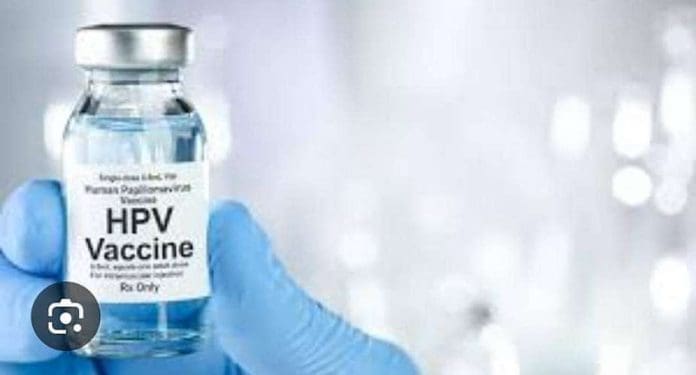
Ghana launched its first nationwide Human Papillomavirus vaccination campaign on Tuesday, targeting 2.4 million girls aged 9 to 14 years in an effort to combat cervical cancer, which claims approximately 1,800 lives annually in the country.
The five-day campaign, running through Friday, October 11, is being implemented by the Ghana Health Service in partnership with Gavi, the Vaccine Alliance, the World Health Organization, and UNICEF. Health workers across the country have been deployed to deliver vaccines through schools, community health centers, and mobile outreach teams to ensure coverage even in hard-to-reach areas.
Martin Morand, Senior Country Manager for Ghana at Gavi, characterized the launch as a major milestone in the global fight against cervical cancer. “Ghana’s action turns promise into progress,” Morand said, adding that each girl vaccinated helps end a long-standing cycle of disease across Africa.
Cervical cancer is the second most common cancer among women in Ghana, with an estimated 3,072 new cases and 1,815 deaths annually, representing what health officials describe as one of the most preventable yet deadly diseases affecting women. The age-standardized incidence rate stands at 27.0 per 100,000, with mortality at 16.9 per 100,000.
With UNICEF support, Ghana has secured 2.5 million doses of the HPV vaccine, enough to protect all eligible girls and potentially prevent around 40,000 future deaths. The single-dose vaccine, approved by the World Health Organization, protects against virus types responsible for most cervical cancer cases, as well as cancers of the vagina, vulva, anus, mouth, throat, head and neck.
Pauliina Mulhovo, UNICEF Representative Officer-in-Charge, described the launch as a significant milestone in Ghana’s public health journey, reaffirming the country’s commitment to safeguard the health and dignity of every girl. “Every girl deserves the chance to live her dreams, free from the threat of cervical cancer,” Mulhovo stated.
She emphasized that the campaign’s success depends on strong community engagement, calling on traditional leaders, educators, civil society, media, and healthcare workers to play active roles in mobilization. The campaign targets both in-school and out-of-school girls to ensure comprehensive coverage across demographic groups.
In the Greater Accra Region alone, the campaign will cover 29 districts and reach over 300,000 girls, with vaccinations taking place in schools, churches, mosques, markets, and other gathering locations. This multi-site approach aims to maximize accessibility and ensure no eligible girl is left behind.
Dr. Fiona Braka, WHO Representative in Ghana, commended the government for its leadership, noting that every dose of the HPV vaccine brings the country closer to a future free from cervical cancer. She reiterated that vaccination, combined with screening and early treatment, offers girls what she characterized as a strong start in life and a true gift of health for generations to come.
Health experts emphasize that vaccinating girls before exposure to the virus represents the most effective strategy for reducing cervical cancer rates and preventing future deaths. The timing of vaccination at ages 9 to 14 captures girls before they become sexually active, when the vaccine provides maximum protection.
Following the five-day campaign, the vaccine will be integrated into Ghana’s routine immunization schedule for 9-year-old girls to ensure sustained and equitable protection for future generations. This integration transforms the campaign from a one-time effort into a permanent component of the national health infrastructure.
Ghana’s campaign aligns with global efforts to eliminate cervical cancer as a public health threat and follows similar initiatives launched in Nigeria, Senegal, and Côte d’Ivoire. Gavi has already supported HPV vaccination for over 60 million girls globally, with Ghana’s inclusion moving the alliance closer to its goal of saving 1.4 million lives.
Across Gavi-supported countries in Africa, studies indicate that for every 1,000 girls vaccinated, 17 future deaths can be prevented, a powerful demonstration of the vaccine’s long-term impact. This evidence-based approach provides confidence that Ghana’s investment will yield measurable health benefits over coming decades.
Yet challenges remain beyond vaccination coverage. Only 5.0% of women in Ghana have undergone cervical cancer screening, suggesting that even as vaccination protects younger generations, addressing the disease burden among current adult women requires parallel efforts in screening and treatment access.
The Ministry of Health, WHO, Gavi, and UNICEF are urging parents and communities nationwide to ensure that every eligible girl receives the HPV vaccine during the campaign and through routine immunization going forward. Community acceptance proves crucial, as vaccine hesitancy or misinformation could undermine coverage targets.
Whether Ghana achieves its ambitious vaccination targets depends partly on logistical execution. Reaching 2.4 million girls within five days requires coordinating thousands of health workers, maintaining cold chain integrity for vaccine storage, and navigating diverse geographic and cultural contexts across the country’s 16 regions.
The campaign represents a significant public health investment whose full benefits will manifest over decades as vaccinated girls reach adulthood protected from HPV-related cancers. For now, success is measured in doses administered, though the ultimate metric will be reduced cervical cancer incidence among future generations of Ghanaian women.
